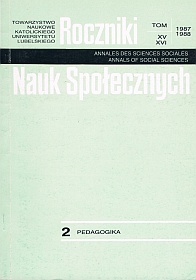Czynniki zagrażające wydolności wychowawczej rodzin niepełnych
Abstrakt
The investigation covered 81 families: 48 families of divorced women and 33 families of widows. The most important factors threatening the educational efficiency of the family are: lack of mother's help with homework, mother's lack of professional qualifications, lack of interest on the part of household members, mother's poor health, father's destructive behaviour during his residence with the family, income below the social minimum, no household duties assigned to children. There are of course differences between the two types of single parent families. In widows' families the image of the father is much more favourable than in the families of divorced women. The former also show stronger bonds between the mother and the children and enjoy better living conditions. The correlation coefficients calculated for the various phenomena, properties of the family environment and the level of danger to educational efficiency are the highest for: mother's knowledge of the child's progress at school and leisure activities; possession of educational equipment; availability of space for study; conversations; family's interest in the child. The second strongest group of correlations comprises: reading magazines; children's duties in the household; joint activities; duration of marriage; mother's education. We can thous conclude that the significant factors are those that concern immediate attitudes to the child and his needs and those that saturate the environment with values.
Copyright (c) 1988 Roczniki Nauk Społecznych

Utwór dostępny jest na licencji Creative Commons Uznanie autorstwa – Użycie niekomercyjne – Bez utworów zależnych 4.0 Międzynarodowe.


